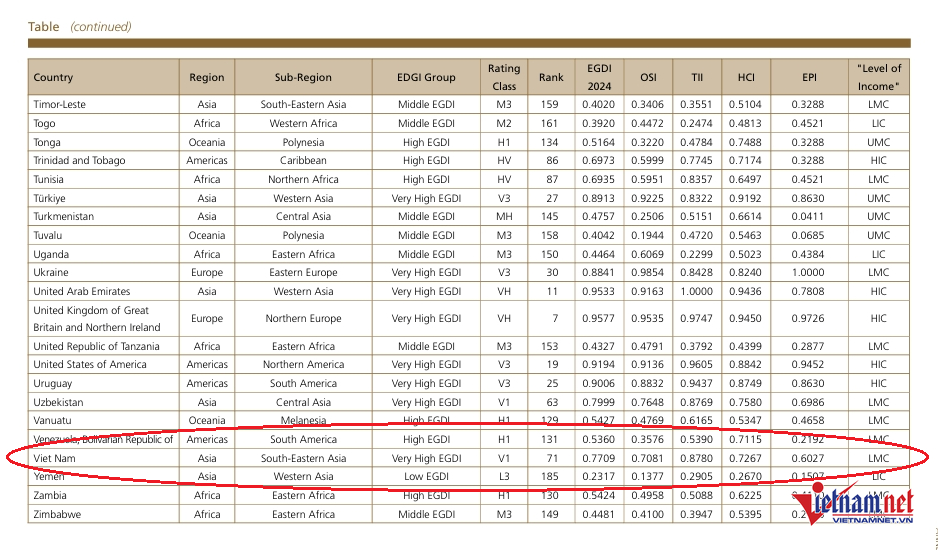
The United Nations recently released its 2024 E-Government Survey, offering a comprehensive overview of countries' progress toward digital government services worldwide. Compared to previous years, more countries are leveraging technology to expand digital services for citizens and businesses.
The 2024 report provides an in-depth look at e-government development on global, regional, national, and local levels across 193 UN member states. These findings are based on various factors, including online government services, telecommunications infrastructure, digital literacy, and citizen participation in digital governance.
Europe continues to lead in e-government development, followed by Asia, the Americas, Oceania, and Africa. While all regions have made significant progress in recent years, the pace of development remains uneven, with considerable disparities between regions.
The UN noted that the global percentage of the population left behind in e-government development has dropped from 45% in 2022 to 22.4% in 2024. However, 1.73 billion people still lack access to basic digital services, with the gap particularly wide in Africa and Oceania.
Countries such as Denmark, Estonia, Singapore, South Korea, and Iceland top the list of the most mature digital public services, according to the EGDI rankings.

This year, after maintaining the 86th position in both 2020 and 2022 with a score of 0.7709, Vietnam has advanced to the "Very High EGDI" group, ranking 71st out of 193 countries. This represents a leap of 15 places.
Key metrics such as the Online Service Index (OSI), Telecommunication Infrastructure Index (TII), Human Capital Index (HCI), and the E-Participation Index (EPI) have all improved compared to two years ago. In Southeast Asia, Vietnam now ranks 5th out of 11 countries, up one spot from 2022.
As a lower-middle-income country, Vietnam’s high ranking in online public services is notable. According to the UN, countries like Vietnam with high TII and EGDI scores can accelerate their digital development by enhancing online service delivery and human capital development.
The UN praised countries like Vietnam for their advancement from high to very high EGDI groups, reflecting successful efforts to strengthen digital infrastructure, expand internet connectivity, and implement robust e-government frameworks. Vietnam’s significant investment in online public services is evident in its improved ranking.
The 13th edition of the UN E-Government Survey also introduced a new digital government model, offering a comprehensive roadmap for countries to plan, implement, and evaluate e-government initiatives effectively. The model emphasizes an ecosystem-based approach focusing on good governance, inclusivity, and security. Its goal is to leverage digital technologies to enhance public service delivery, promote inclusivity, and achieve sustainable development goals.
This year’s report also features a chapter on the potential impact of artificial intelligence (AI) on the public sector. Vincenzo Aquaro, Head of the UN Department of Economic and Social Affairs’ E-Government Division, noted that while AI can automate processes, increase efficiency, and improve decision-making, its rapid development has outpaced existing legal frameworks.
During the report’s launch, Aquaro highlighted the disparity between the number of countries with AI regulations and those with solid e-government strategies. He stressed the importance of aligning AI regulations with existing e-government frameworks and incorporating AI into broader digital government strategies to ensure effective implementation and avoid governance conflicts.
The UN’s 2024 report also includes several key recommendations, such as fully digitizing public services, improving telecommunications infrastructure, enhancing legal frameworks for digital development (especially regarding emerging technologies like AI, cloud computing, open data licensing, and digital identity), and encouraging greater public participation in policymaking and decision-making processes.
Du Lam